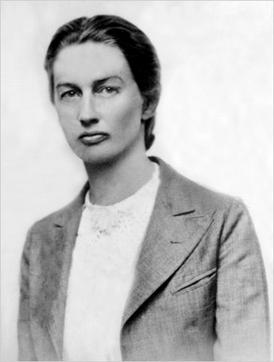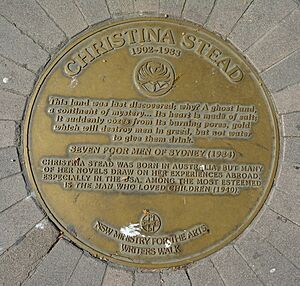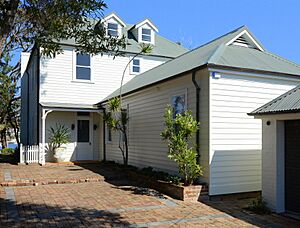Christina Stead facts for kids
Quick facts for kids
Christina Stead
|
|
|---|---|

Christina Stead in 1938
|
|
| Born | Christina Ellen Stead 17 July 1902 Rockdale, New South Wales, Australia |
| Died | 31 March 1983 (aged 80) Sydney, New South Wales, Australia |
| Language | English |
| Years active | 1921-1983 |
| Notable works | The Man Who Loved Children |
| Notable awards | Patrick White Award |
Christina Stead (born July 17, 1902 – died March 31, 1983) was a famous Australian writer. She wrote many novels and short stories. People admired her for her clever writing and how well she described what people were thinking and feeling.
Christina Stead believed in ideas about fairness and equality for everyone. These ideas are sometimes called Marxism. Even though she held these beliefs, she was never officially part of the Communist Party of Australia. She lived outside Australia for a long time but came back before she passed away.
Contents
About Christina Stead's Life
Christina Stead's father was David George Stead. He was a marine biologist, which means he studied sea life. He was also one of the first people to work on protecting nature in Australia.
Christina was born in Rockdale, a suburb of Sydney. Her family later moved to Watsons Bay in 1911. She was the only child from her father's first marriage. She had five half-siblings from his second marriage. Her father also married a third time to Thistle Yolette Harris, who was a botanist and writer.
Some people said that the house in Watsons Bay was a difficult place for Christina. This was because her father was very strong-willed. In 1928, she left Australia. She worked in a bank in Paris, France, from 1930 to 1935.
Stead also met a writer and economist named William J. Blake. He was interested in Marxist ideas, like her. They traveled together to Spain and the USA. They got married in 1952. Christina returned to Australia after Blake died in 1968. She also came back after she was told she couldn't win a big Australian writing prize. They said she was no longer "Australian" enough.
Christina Stead's Books and Stories
Christina Stead wrote 12 novels and several collections of short stories. She also taught a writing class at New York University in 1943 and 1944. In the 1940s, she worked in Hollywood as a screenwriter. She helped write movies like Madame Curie and the war film They Were Expendable.
Her first novel was Seven Poor Men of Sydney (1934). It was about the lives of workers and people who wanted big changes in society. However, her writing style was not just about showing real life exactly as it was.
Stead's most famous novel is The Man Who Loved Children. This book is largely based on her own childhood experiences. It was first published in 1940. The book became much more popular in 1965. This happened after a poet named Randall Jarrell wrote an introduction for a new American edition. Her publisher also convinced her to change the story's setting from Sydney to Washington, D.C.
In 2005, Time magazine included The Man Who Loved Children in its list of "100 Best Novels from 1923–2005." In 2010, American author Jonathan Franzen called it a "masterpiece" in The New York Times.
Stead's only novel set in Britain was Cotters' England. Part of this book takes place in Gateshead, which she called Bridgehead in the story. She visited Newcastle upon Tyne in 1949. Her friend Anne Dooley, who lived there, was the inspiration for the main character, Nellie Cotter. Anne probably helped Stead write the local accent well. Stead's letters show she learned about the local speech and cared deeply about the people there. The American title for this book is Dark Places of the Heart.
Christina Stead passed away in a hospital in Balmain, Sydney, in 1983. She was 80 years old. Her old home in Watsons Bay was the first place chosen for a special plaque. This plaque scheme started in 2014. It honors important people who lived in the Woollahra area. A plaque was placed on the footpath outside her former home.
Works

Novels
- Seven Poor Men of Sydney (1934)
- The Beauties and Furies (1936)
- House of All Nations (1938)
- The Man Who Loved Children (1940)
- For Love Alone (1945)
- Letty Fox: Her Luck (1946)
- A Little Tea, a Little Chat (1948)
- The People with the Dogs (1952)
- Dark Places of the Heart (1966) (also known as Cotters' England)
- The Little Hotel (1973)
- Miss Herbert (The Suburban Wife) (1976)
- I'm Dying Laughing: The Humourist (1986)
Short stories
- The Salzburg Tales (1934)
- The Puzzleheaded Girl: Four Novellas (1965) (includes The Puzzleheaded Girl, The Dianas, The Rightangled Creek and Girl from the Beach)
- A Christina Stead Reader (1978) edited by Jean B. Read
- Ocean of Story: The Uncollected Stories of Christina Stead, edited by R. G. Geering (1985)
Letters
- Web of Friendship: Selected letters, 1928–1973, edited by R.G. Geering (1992)
- Talking into the Typewriter: Selected letters, 1973–1983, edited by R.G. Geering (1992)
- Dearest Munx: The Letters of Christina Stead and William J. Blake, edited by Margaret Harris (2006) ISBN: 0-522-85173-8
Translations
- In balloon and Bathyscaphe by Auguste Piccard (1955)
- Colour of Asia by Fernando Gigon (1956)
See also
 In Spanish: Christina Stead para niños
In Spanish: Christina Stead para niños
 | Charles R. Drew |
 | Benjamin Banneker |
 | Jane C. Wright |
 | Roger Arliner Young |


